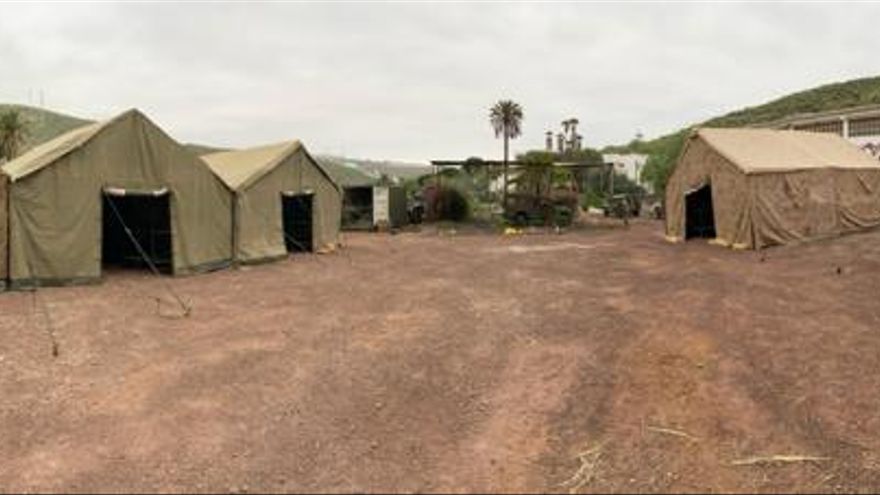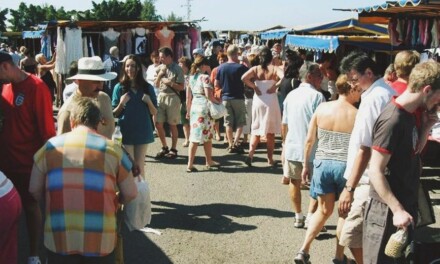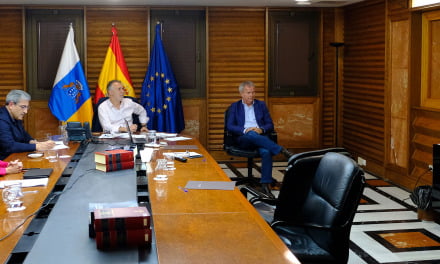The Spanish Army have constructed a transit camp at their old Barranco Seco facility, ready to start receiving migrants currently crowded onto the harbour pier in the port of Arguineguín. The army’s Twitter account was used to announce that the Canary Islands XVI Brigade has erected 23 tents (nine more than those available in Arguineguín) at the facilities assigned to the Ministry of the Interior, to which, once completed a total of up to 800 migrants will be transferred and accommodated and so help put an end to the deplorable situation that has continued for the several months on the south of the island.
La Brigada ‘Canarias’ XVI del @MCANA_ET monta un campamento de 200 plazas con 23 tiendas en el antiguo polvorín de ‘Barranco Seco’, en Las Palmas de Gran Canaria.
Instalaciones transferidas al Ministerio del Interior @interiorgob . pic.twitter.com/ZgLwAw0mxm— @EjercitoTierra ?? (@EjercitoTierra) November 11, 2020
 When, exactly, migrants will be transferred is still not yet known, with the first tents, containing 200 berths, having been completed today.
When, exactly, migrants will be transferred is still not yet known, with the first tents, containing 200 berths, having been completed today.
Earlier this summer, the Spanish Red Cross had tried to set up an emergency camp, in collaboration with the United Nations High Commission for Refugees (UNHCR), with tents and prefabricated modules to accommodate up to a thousand people, on land granted by the Spanish State Port Authority, in Arinaga, on the south east coast of Gran Canaria. The idea, then, was to anticipate a long expected rebound in migrant arrivals, which they had repeatedly warned could start to reach record numbers by the end of summer 202 and the first weeks of autumn, when Atlantic weather conditions in this area generally favour navigation in small boats.
 However, weeks later they had to dismantle the reception camp due to the refusal of the Agüimes Town Hall, who would not give the necessary permits, which caused the UNHCR to remove the facilities and left the Red Cross to erect a makeshift camp at the Arguineguín dockside, which is the main Maritime Rescue landings base for the south of the island, and where several search and rescue vessels are maintained.
However, weeks later they had to dismantle the reception camp due to the refusal of the Agüimes Town Hall, who would not give the necessary permits, which caused the UNHCR to remove the facilities and left the Red Cross to erect a makeshift camp at the Arguineguín dockside, which is the main Maritime Rescue landings base for the south of the island, and where several search and rescue vessels are maintained.
That camp opened on August 20, theoretically for a maximum capacity of about 400 people at a time, but has been repeatedly overwhelmed by the much higher than expected flow of migrants, reaching up to 1,400 people a day at times, to which Gran Canaria’s humanitarian reception network could not respond quickly enough, even after they expanded their available resources by placing migrants into tourist resort accommodation, that had been left empty due to the current health crisis.
 At times more than 2,000 people have been crowded onto the Arguineguín port, without sufficient tents available for everyone, in all cases forced to sleep on the ground, their only protection from the elements a blanket, and in some cases having had to remain there up to two weeks at a time, when legally conditions such as these should not exceed 72 hours. The effort has been further complicated by needing to test every arrival for coronavirus, and wait at least 2 days for the results, while maintaining each group of arrivals separately from each other.
At times more than 2,000 people have been crowded onto the Arguineguín port, without sufficient tents available for everyone, in all cases forced to sleep on the ground, their only protection from the elements a blanket, and in some cases having had to remain there up to two weeks at a time, when legally conditions such as these should not exceed 72 hours. The effort has been further complicated by needing to test every arrival for coronavirus, and wait at least 2 days for the results, while maintaining each group of arrivals separately from each other.
Spain’s Minister of the Interior, Fernando Grande-Marlaska, announced during his visit to the island, last Friday, that “in a few weeks” the Arguineguín camp would be closed and facilities provided by the Ministry of Defense would take over the reception protocols for new arrivals.
About bloody time.
 That it has taken this long to confirm that migrants will be transferred from the Arguineguín port is pretty inexcusable. Particularly as it has allowed far-right anti-immigration rhetoric to publicly rear its ugly head on the south of the island, using a humanitarian crisis to prey on the fears and frustrations of a population already suffering from profound poverty, questionable leadership and the economic effects of the crisis generated in the wake of the coronavirus pandemic response. Fascist ideologies thrive when falsely pitting one set of poor people against another, as has been seen time and time again.
That it has taken this long to confirm that migrants will be transferred from the Arguineguín port is pretty inexcusable. Particularly as it has allowed far-right anti-immigration rhetoric to publicly rear its ugly head on the south of the island, using a humanitarian crisis to prey on the fears and frustrations of a population already suffering from profound poverty, questionable leadership and the economic effects of the crisis generated in the wake of the coronavirus pandemic response. Fascist ideologies thrive when falsely pitting one set of poor people against another, as has been seen time and time again.
By claiming concern over the treatment of migrant arrivals, local politicians too have insidiously sought to distract public attention from serious allegations levied against them, following multiple arrests in an ongoing electoral fraud investigation, and shielded them from scrutiny after the local town hall’s highly controversial decision to close the only food bank distribution point in the area.
With luck, the flow of migrants will be reduced over coming weeks as the weather becomes less favourable and the proper processing of those arriving on the islands can continue in an orderly manner, without racists pretending to be realists to further their own interests, and allow EU and Spanish governments to try to work more closely with migration experts and African countries from which many of these people try to escape in an effort to reduce the causes of these migratory flows which have lead more than 15,000 people to risk their lives in open boats to come here. We can hope too that proactive policies may start to reduce, too, the estimated thousand or more people who have died horribly in the attempt already so far this year.
More than 7,000 migrants have reportedly been transferred to mainland spain, into facilities set up by the Ministry of Migration, with those currently being temporarily accommodated in tourist resorts expected to be moved on too in coming weeks.
Arguineguín, in Gran Canaria’s southern tourist municipality of Mogán, can once again begin to return to the multitude of social issues that have been affecting the area, both before and since the pandemic wrought havoc on the local economy and poorest members of society.














